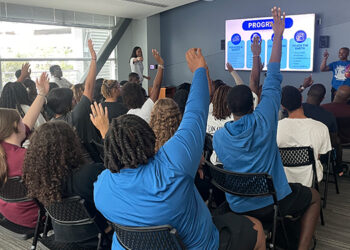“It does not matter who you hire, you have to teach them something.” These words were spoken by J. Rex Tolliver, the VP for Student Affairs and Academic Support, during a divisional meeting. These words have never been truer for our department than they have as of late.
Roughly half of the full-time Campus Recreation staff at the University of South Carolina are not what you would consider “traditional” campus recreation folks. They were either not campus recreation employees before being hired or didn’t follow the graduate assistant route. For us, this meant they were knowledgeable and experienced in their area, but we needed to teach them about campus recreation, working at a university and sometimes a combination of the two.
Several staff members were promoted and began supervising professional staff for the first time or began supervising a new area they did not have prior experience with. We guided them to take leadership courses and explore professional development opportunities to increase their knowledge and skills necessary to be a successful supervisor of these staff and areas.
Expanding Options by Being Open-Minded
Both are examples of staff who had to learn something new and be taught a new set of skills. Their supervisors made the choice to hire them knowing there would be area(s) these individuals would need to be taught, requiring extra attention. While not a groundbreaking development, by saying it out loud and being more intentional about our hiring, we open ourselves to the possibility of finding the best candidate and not limiting our pool.
As the landscape of higher education continues to change, I believe it’s important we embrace these words because our pool of traditional campus rec applicants is smaller than it’s been, and our pool of individuals seeking careers in campus recreation is less than ever. We need to be open to candidates with new and diverse perspectives and experiences. This may come in the form of candidates who do not currently work in campus recreation.
This trend also emphasizes the importance of a strong onboarding plan for new staff members. At South Carolina we have placed additional focus on the creation and tracking of these onboarding plans for our most recent hires. These onboarding plans detail specifics from required HR and university trainings, learning tours with other campus recreation and university partners, and area specific training.
Onboarding Success Stories
These onboarding plans are not a one size fit all and change based on the level of the position and time of year, but strategically plan out the first eight weeks of one’s employment and the weeks leading up to their first day. The following quotes are from two of our newest employees who are not what you would consider “traditional applicants” about their onboarding experience:
Kate Dienhart, the assistant director of Services and Events, who previously worked at SharpTop Cove, a Young Life Camp, as a Guest Services Specialist.
“My onboarding plan was very helpful! Coming into this world, I had much to learn, from larger items such as how our systems work, to smaller items like what NIRSA is. My supervisor walked me through the onboarding plan each week until I felt comfortable to start managing my time and projects on my own. Through the plan, I got to meet everyone I would work with, learn about what they do and why, and understand my job piece-by-piece. It came to a natural end, and I felt prepared to continue forward with my job in Campus Rec.”
Quashon Johnson, the Outreach & Engagement coordinator, who previously worked at Mark Anthony Brewing, as an executive administrative assistant.
“The onboarding process was insightful as it clarified the roles of each team member in the department. This helped me better understand my role by providing a primary contact for communications and coordination of projects, while helping me understand their work culture. The detailed plan asynchronously laid out university required trainings and specific job tasks.”
Whether the person you hire is an internal employee being promoted, an individual who already works at the university or someone being hired externally, no one walks in and knows exactly what to do or how systems function at your institution. You have to teach everyone something, so let’s be more open about who we hire.










